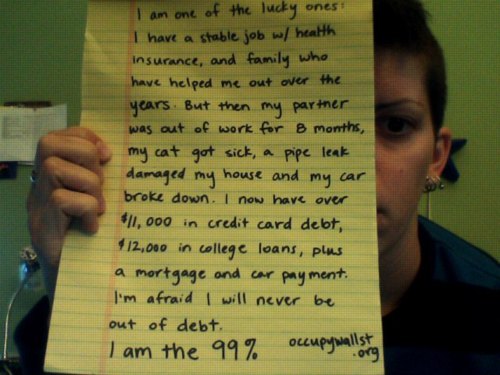Note! A newer version of this is now posted over at Sociological Images.
Although I left the U.S. this fall to find professional work, I’ve been reading the 99 percent for several months now. As of today, over 2700 individuals have submitted pictures of themselves (usually partially obscured) with letters and signs against the backdrop of homes and offices, campuses, strikes and protests across the U.S:
While there’s been a solid critique of how whites, youth, and those with college access have a larger voice on this site, as well as dismissive responses from “53%ers” on the right, I’m still struck by the rhetoric used. I’m struck by the power of a stream of letters and posters conveying hope, fear, anger, resignation, and desperation – a variety of responses to feeling trapped and disillusioned, the stages of dying for the American dream.
But one word in this stands out to me as particularly jarring: Luck.
[Written for a child] “I am 3 years old and lucky to go to preschool, have a roof over my head and spaghetti-o’s in my belly. I am lucky to have Medicaid while my parents don’t qualify.”
“i am 22, living in a trailer in exchange for labor… We eat 69c mac’n’cheez or ramen; i drive a car illegal with disrepairs. And i’m lucky.”
“I am lucky my husband has a decent job because before I was on his health insurance my coverage denied normal, annual GYN visits because ‘Being a woman is a pre existing condition.’ And we are the lucky ones!!”
“But I am one of the lucky ones. I was finally diagnosed with borderline personality disorder I am properly medicated”
“I’m one of the lucky ones. I enjoy my part-time job… yet… [have a] $65,000 [student] loan. 4 side jobs – not enough for rent. No health insurance. No children, so I don’t qualify for any aid, but I’m one of the lucky ones.”
“I am a lucky one. I have enough money to eat 3 of 4 weeks of the month…”
Luck is a word that comes up incredibly frequently among the 99 percenters, alongside words like debt, crisis, and unemployment. But what kind of luck is this? What does it mean to be “one of the lucky ones?”
In these posts, people call themselves “lucky” for having food most of the month, enough work to survive, or health care for part of their family – even as they report drowning in debt, losing work, and losing hope.
This isn’t our usual meaning for luck, and it only makes sense in comparison – to the “unlucky ones.” But if the “99 percent” is lucky, who exactly is unlucky? And how does this “luck” relate to the accompanying uncertainty, stalled careers, and failure to attain personal and collective dreams?
After participating myself, I was startled to realize I’d also used the rhetoric of luck as a frame for my complaint. Of course I live in relative privilege to others, but why subsume my experience of uncertainty and dislocation beneath that privilege?
On the positive side, the rhetoric of luck acknowledges our relationships to other human beings, our relative privilege, and the structural and economic challenges that even “lucky” people face. But I would also argue that this same rhetoric turns our lives into happenstance, and serves to move this stream of stories harmlessly to the side so that larger narratives about luck, hard work, and the American Dream can continue as planned. By prefacing our stories with an admission of luck, we displace our own voices.
So the question I’d like to ask more of the 99 percenters to address is, what other frames could we set up to talk about our experiences? What kind of lives are we, right and left, young and old, lucky and unlucky, hoping to bring to fruition?


Two posts with very different topics, yet one consistent theme: re-framing to see more clearly.
You’ve challenged me to think…and that is a good thing…